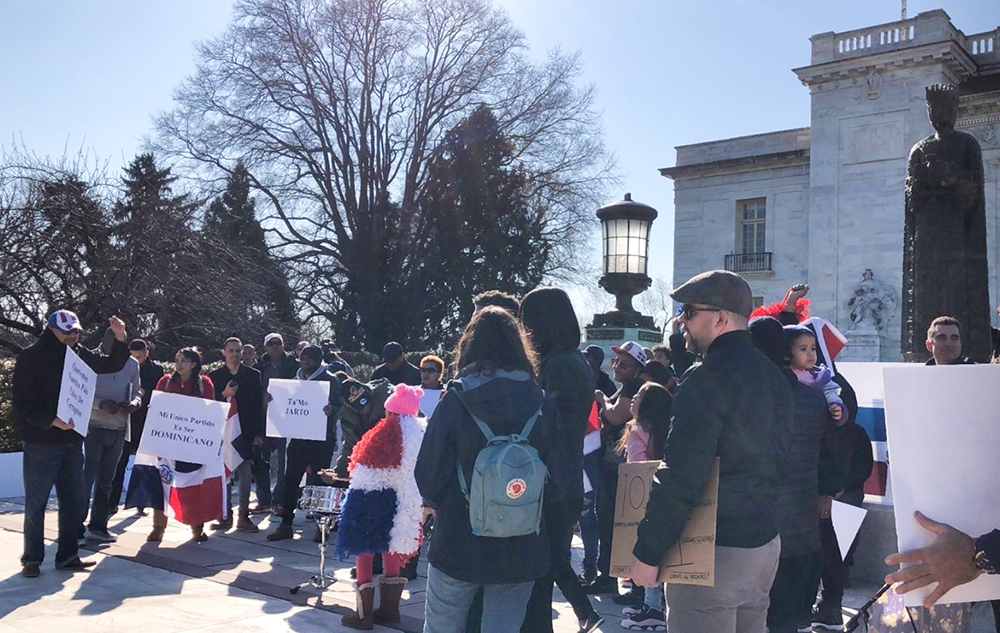Members of Georgetown University Riqueza Dominicana, a student-run Dominican cultural club, attended a protest near the White House on Sunday opposing the Dominican Republic’s recent suspension of nationwide municipal elections.
Protests first began in the Dominican Republic on Feb. 16 when the suspension began and were followed by similar protests in several major cities around the world, including Washington, D.C. The D.C. protest, which was organized via a Facebook page, took place near the White House at 2:30 p.m. Six members of Riqueza Dominicana attended the protest, which totaled over 150 attendees, according to Communications Director of Riqueza Dominicana Nicole Sanchez (SFS ’22).
Protests in the Dominican Republic began shortly after the government suspended nationwide municipal elections four hours after the start of the elections, when officials realized that many voters were unable to see complete ballots on the electronic voting machines, according to The New York Times. The voting machines were used in the capital, Santo Domingo, as well as 17 of the most populous of the Dominican Republic’s 158 municipalities, according to BBC News.

The glitch in the voting machines benefitted the current party in power, the Dominican Liberation Party, as many candidates from opposition parties were not listed on the incomplete ballots, according to Sanchez.
“The new voting system was only showing the current party in power, the Dominican Liberation Party—which has been in power for sixteen years. They are also the party that oversees the elections,” Sanchez wrote in an email to The Hoya. “The PLD has not been transparent with this ‘glitch’ and has not publicized their plan to move forward.”
The goal of the D.C. protest was to demonstrate support for the people of the Dominican Republic who are currently fighting for a more transparent democracy and elections, according to Sanchez.
“Our objective is to show our support for those on the island who are being effected directly by the political corruption,” Sanchez wrote in an email to The Hoya. “Our organization is protesting to show that what we care about what happens in our homeland though we live thousands of miles away. Just because we no longer live there does not mean that we have forgotten about our people.”
This instance is not the first time the country has faced issues with its electronic voting system. After the Dominican Republic’s 2016 presidential election, the Central Electoral Board spent 13 days counting votes that were cast electronically. The protests in the Dominican Republic reflect a growing concern about protecting elections as electronic voting systems come under scrutiny around the world, as in the case of the recent e-voting system failure during the United States’ Iowa Democratic primary caucuses, according to the New York Times.
Students calling for better electoral procedure in the Dominican Republic augments broader efforts to unseat long-term corruption in the country, according to Leslie Rozon (NHS ’23), a member of Riqueza Dominicana who also attended the protest.
“Dominican mentality has to change as well, because with corruption a lot of people usually get paid to vote for a specific party,” Rozon said. “Something that would also help is the voting of the youth in this country, many young people don’t vote, so their voices are overlooked.”
The protests surrounding the Dominican Republic’s election suspension displays the impact that protesters can have on political reform and applies to other countries in the region, according to Academic Director of the Center for Latin American Studies Angelo Santos.
“If young people are able to impact electoral reforms, they also have the challenge to continue monitoring the transparency of their elections through several means (not only through voting and protests, but by engaging in the political process),” Santos wrote in an email to The Hoya. “This is true not only for the Dominican Republic, but for every other country in the region.”




















